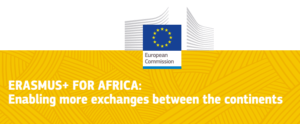The EU has invested an additional €17.6 million to support over 8,500 newly selected African students and staff to participate in Erasmus+ in 2019.
This increase in Erasmus+ funding is one more step towards the commitment announced by President Jean-Claude Juncker in his State of the Union speech in September 2018 to have supported 35,000 African students and researchers by 2020.
The EU has invested an additional €17.6 million to support over 8,500 newly selected African students and staff to participate in Erasmus+ in 2019. This increase in Erasmus+ funding is one more step towards the commitment announced by President Jean-Claude Juncker in his State of the Union speech in September 2018 to have supported 35,000 African students and researchers by 2020.
The EU has invested an additional €17.6 million to support over 8,500 newly selected African students and staff to participate in Erasmus+ in 2019. This increase in Erasmus+ funding is one more step towards the commitment announced by President Jean-Claude Juncker in his State of the Union speech in September 2018 to have supported 35,000 African students and researchers by 2020.
The results of the 2019 Erasmus+ call bring the total number of exchanges between Africa and Europe to 26,247 since the beginning of the programme in 2014 and well on track to meeting the 2020 target of supporting 35,000 people as announced in the Africa-Europe Alliance for Sustainable Investment and Jobs. This year, 8,555 African and 4,649 European university students and staff will benefit from exchanges in 53 African countries and the 34 European countries that participate in the Erasmus+ programme. Students will be able to stay abroad for up to one year, while staff exchanges last up to two months.
The additional funding of €17.6 million – coming from the Commission’s external financial instruments and the EU Trust Fund for Africa –has boosted participation by African nationals by 40% overall. For countries in Western Africa and the Horn of Africa, the number of scholarships has more than doubled thanks to the additional money. It has also made it possible to include more countries in the programme, such as Eritrea, Sierra Leone, Liberia, Congo and Burundi, and to increase the number of exchanges, in particular for Benin, Cape Verde, Mali, Niger, Nigeria and Somalia.
Contexto
Investing in inclusive and equitable quality education for all is a key priority for the EU, in line with the United Nations’ Sustainable Development Goals(link is external). Education at all levels and investment in young people are vital for improvements in skills and employment, for sustainable growth, and for active citizenship.
Investing in people by investing in education and skills is one of the cornerstones of the Africa-Europe Alliance, which aims to take the EU’s partnership with Africa to the next level. To do so, the Commission proposes to boost investment, to further attract private investors, to support education and skills development for employability, as well as to boost trade and improve the business climate.
Besides setting up new areas and new channels for cooperation, the Africa-Europe Alliance also seeks to leverage the potential of the EU’s existing programmes for international cooperation. Channelling additional funding into Erasmus+ is boosting participation by African people and organisations with the objective of supporting the mobility of 35,000 students and researchers from the African continent by 2020, leading to a total number of 105,000 by 2027.
Erasmus+ is the European Union programme for education, training, youth and sport for the period 2014-2020. Erasmus+ funds academic and youth mobility and cooperation between Europe and other regions in the world, including Africa, where it supports activities that are closely matched with the EU’s policy cooperation priorities for the continent. African countries have been able to take part in Erasmus+ as partner countries since 2014.
Más información
The Africa-EU Partnership(link is external)






Leave a Reply